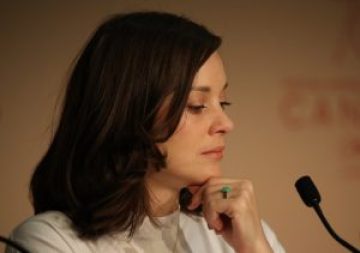Marion Cotillard brings Arnaud Desplechin’s Ismael’s Ghosts to life.

Les fantômes d’Ismaël, otherwise known as Ismael’s Ghosts, revolves around Ismael, acted by Mathieu Amalric, a man who had become lost by the death of his previous wife, Carlotta, who is played respectfully by Marion Cotillard.
Since her declared death, administered by Ismael himself due to her vanished status (her body was nowhere to be found), Ismael sought the movie industry as his other true passion.
Throughout Ismael’s Ghosts, the audience sees two timelines – one of Ismael’s life and the other of the film he is actually creating 21 years after Carlotta’s disappearance.
Sylvia, played by Charlotte Gainsbourg, stumbles into Ismael’s life out of fascination at a time slightly before he took off on this movie’s production. After being around mutual friends, the two clicked almost immediately, intriguing one another by each other’s differences.
Before Ismael, Sylvia was a prude-like woman. Before Sylvia, Ismael had not fallen ever more in love. After being together for some time, they moved to the countryside. Sylvia spent many of her days reading on the beach, but on one day, she is approached by Carlotta herself. Shocked by the news that a deceased is before her, Sylvia does what she does not want to do; she brings Carlotta before Ismael, and ever since, the three’s worlds shake.
Ismael’s Ghosts includes heated moments of lust, greed, and heavy flashbacks, where subplots among subplots emerge.

There is the movie Ismael is making, of course, but this subplot becomes confusing as information about Ismael that comes later in the movie incites a question. Another subplot involves Carlotta’s father handling her death and then return, and Ismael’s involvement with wanting to tell him the truth he deserves. A final subplot, connected to Ismael’s movie as well, is a concerned producer wondering if the movie will even be finished.
There is a particular scene where Ismael has run away to Paris, where he was born, to hide in his aunt’s house – here he reconnects with art history, the “Arnolfini Wedding” painting by Jan Van Eyck popping up throughout the movie a couple of times for symbolism in loyalty and fidelity in marriage, relating to Carlotta.
Art history, though, is only mentioned slightly, and one has to know their history before seeing Ismael’s Ghosts to revel in the hidden symbolism.
The main character within Ismael’s film, Ivan, was also his brother’s name. Which is why the first, main subplot is slightly confusing. Carlotta mentions, only briefly, of how Ismael’s brother is doing, and then it returns to his movie.

It is unclear whether or not he actually has a brother, another ghost, that he has decided to make a movie about in regard to his characteristics, therefore showing what imagination Ismael has in his scriptwriting, or simply if the brother is the movie itself. It may be up to the audience to decide for themselves.
Being French, lots of the traits within this film – love making scenes and the different types of lovemaking, coy greed with Carlotta, the fact that both Carlotta and Sylvia look alike, which would drive Ismael mad because as he regained Carlotta he slowly lost Sylvia – come together to make a slightly jumpy but appreciated story of a love lost and love gained and lost again.

Loyalty seized, was gained, forgotten, and then lost. Love was evident as so many cared for the other.
Sylvia, even, in another subplot, focused on trying to make amends between Carlotta and Ismael, but this ended in her leaving the situation entirely for her to focus on her studies as a very intelligent woman. Yet, she remains in their lives from afar, still caring about it all. The cinematography work accents these changes and more.
The imagery was obviously carefully planned and reflected each moment in a refreshing yet fitting way. Aside from a couple scenes where more than one thing was shown at once – projections of actions on top of the main angle were displayed, making for the scene or moment to not actually be taken as seriously – imagery played a vital role in helping symbolism be evident enough to be subtly impactful. There is a saying that everything within the image is important and matters, and Irina Lubtchansky, the cinematographer, made that so.
The director, Arnaud Desplechin, not only favors such traits as these, where heavy symbolism meets direct sexual intention and lustful greed of wanting what others have but actors and themes come into play with his work.
These are evident through this movie and his previously rejected movie My Golden Days, a coming-of-age romance, from the Cannes Official Selection in 2015. Now to have Ismael’s Ghosts appear as the opening movie seems almost an apology to him and this does not have to be viewed as negative.
Cannes opening the 70th Festival with a French movie alone appeases French filmmakers after them demanding more heartfelt movies that also did not happen to be produced by an online company.
Ismael’s Ghosts soothed the French, even if it may not be appreciated entirely for its jumpiness and mixing of heavy subplots from people around the world, causing its approval rate to fall drastically since its showing at Cannes.
Still, many from around the world will appreciate this movie for what it offers in teaching about the effects of pain in love and how complicated it can become.
[ytp_video source=”IgHtE9OzrhU”]

